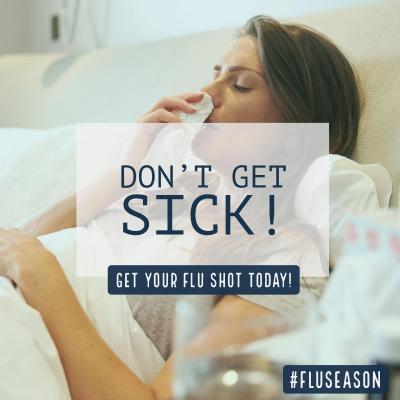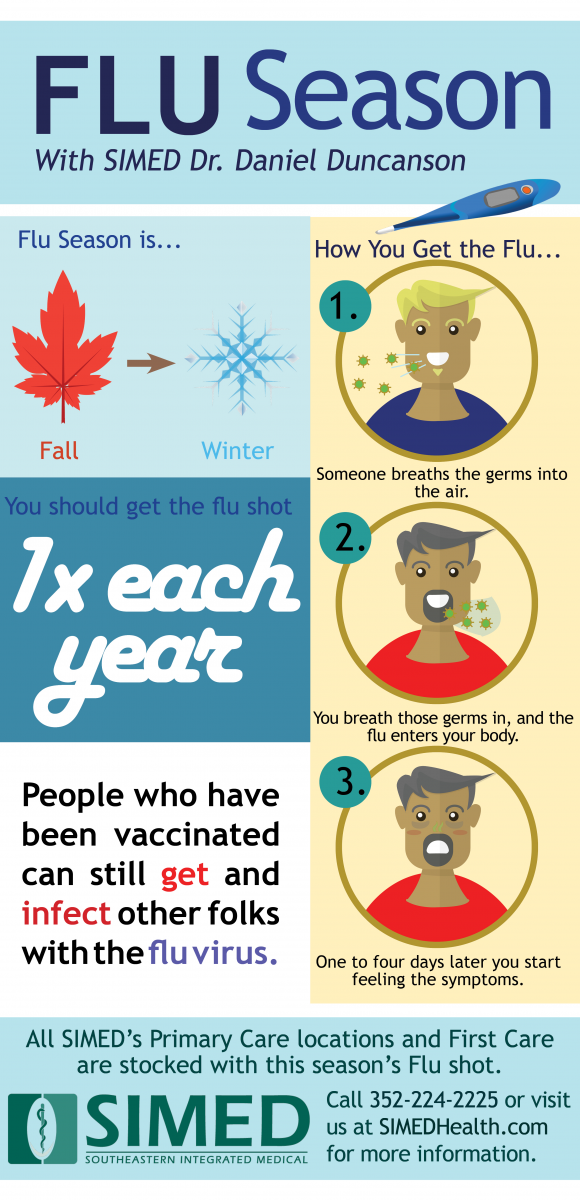
It may seem like we just finished up the last Flu season however it’s time to start considering getting this season’s Flu shot. We asked SIMED Primary Care physician Dr. Daniel Duncanson some questions about the Flu season and the Flu shot.
Can it already be time for another Flu shot?
Yes. The “Flu season” in the United States runs from fall through winter. In some parts of the world, Flu season is year round so we can consider ourselves lucky to have an “off season.”
What is the Flu?
The flu illness is caused by an infection of the Influenza virus.
First, the virus enters the air around us in droplets when someone infected with the virus coughs, sneezes, or talks.
Second, droplets are inhaled, entering our body through the lining of our respiratory system in our nasal passages, sinuses or lungs.
Once the flu is in our system, we start to feel sick 1- 4 days later.
The symptoms can vary but usually are a combination of fever (or feeling of fever), chills, cough, sore throat, sinus congestion, runny nose, headache, and fatigue (often much more so than with other viral illnesses). Children commonly have vomiting and diarrhea associated with an Influenza illness.
Who is at risk of getting the Flu?
Everyone. We’re all breathing, and if the droplets are around, anyone can inhale them and develop the flu. Those that have been vaccinated tend to have a much less severe illness and some don’t develop any noticeable illness.
Are there people who are at higher risk of getting the Flu?
Some people are at an increased risk of having a more serious illness when exposed to the Influenza virus. These people include the very young, those older than 65 years, those with chronic medical conditions (for example asthma, diabetes, heart disease), and during pregnancy and up to two weeks after delivery.
You stated those who received the Flu shot have a less serious illness. Tell us about the Flu shot. When should we get it? Why do we need to get it every year?
The Influenza virus is different than many other viruses because it can frequently alter its outer envelope. The outer envelope is what our immune system recognizes and uses to fight the virus.
When you are administered a vaccine, you are enhancing your immune system’s ability to respond aggressively to the virus. For a virus like the chicken pox virus, the outer envelope doesn’t change much over time so a single vaccination cycle provides excellent life-long protection from illness. However, because the Influenza virus changes often, we have to update our immune system’s response based on the recent years’ Influenza events.
The vaccine changes year to year and provides protection against the 3 or 4 Influenza virus strains infectious disease and epidemiology experts predict will be most prevalent in the upcoming Flu season.
Each season’s Flu shot (Influenza vaccines) tend to become available in late summer and can be administered into the early spring. Flu season tends to peak in the US during the colder weather months.
It takes about 2 weeks after receiving the vaccine before protection begins, and the protection lasts for several months. The vaccine, a single dose injection, is advised for everyone over the age of 6 months except people who previously had a serious adverse reaction to an Influenza vaccine dose.
The Influenza vaccine is cultivated in eggs, and a small amount of egg protein may be contained in the vaccine. Regardless, people with egg allergies are now advised to receive the vaccine. People with egg allergy symptoms that go beyond hives (for example, people who develop angioedema, respiratory distress, light-headed, recurrent vomiting, or previously required epinephrine administration due to the allergy) are advised to have the vaccine administered in a health care setting with a health care provider supervising who has the ability to recognize and manage severe allergic reactions.
I see pharmacies all over the place advertising the Flu shot. Does it matter whether I receive the vaccine from my pharmacist versus my doctor’s office?
No, it doesn’t matter where you receive the vaccine. The important thing is to receive the vaccine each season. As a physician, I prefer my patients get it from our clinics. That way, we can get the administration information and update our immunization record on each patient.
Wherever you decide to receive it, make sure you have a single entity maintaining your immunization record. Your medical record at your Primary Care physician is a logical place for your complete immunization record to be maintained, so wherever you receive any immunization, make sure your Primary Care physician’s office is aware of this information.
What is the difference between the “high-dose” vaccine and the regular vaccine?
For decades the annual Influenza vaccine was a trivalent vaccine. Trivalent refers to the three different strains of Influenza viruses that were covered in each vaccine.
A few years ago, studies showed those at high risk of serious illness fared better by receiving a quadrivalent vaccine, containing protection against four strains of Influenza viruses. Thus, the “high-dose” refers to the 4 strains vs. 3 strains of virus protection.
People who should receive the quadrivalent, “high-dose” vaccine include anyone 65 years old and older and anyone else at risk of serious illness from the Flu.
If everyone else at home and work receives the Flu shot, why should I?
Because receiving the Flu shot doesn’t mean you can’t get the Influenza virus and won’t spread droplets. In fact, the opposite is true. People who get the Flu shot can still feel ill from the Influenza virus, but the illness is much less likely to be severe. They can still develop a milder cough, runny nose, congestion, etc. and spread droplets. Their illness is likely to be mild and of shorter duration with complete recovery. If you don’t get the Flu shot, you can get the Flu from them.
So, if I get the Flu, what can be done?
As soon as possible, visit your Primary Care Physician’s office, or if they aren’t available, go to an urgent care center (like SIMED’s First Care in Gainesville).
Testing can be done to confirm the illness is from the Influenza virus, and if confirmed, there are medications that can be prescribed to decrease the duration of illness and reduce the risk of serious complications.
These medications are:
1. Tamiflu (oseltamivir) taken as a pill or in liquid form
2. Relenza (zanamivir) an inhaled powder
3. Rapivab (peramivir) dosed intravenously usually in a hospital setting.
Tamiflu is also approved for prevention if a household contact has been diagnosed with an Influenza illness. This medication has been shown to decrease the risk of others exposed to Influenza from becoming ill.
All SIMED’s Primary Care locations and First Care are stocked with this season’s Flu shot. If you are already a patient of SIMED, no appointment is needed to receive the immunization. Walk-ins for the Flu shot are accepted at First Care.
If you’d like to establish with a SIMED Primary Care physician, call 352-224-2225 to schedule your initial appointment or contact us with an appointment request online via our website SIMEDHealth.com.
First Care is SIMED’s Gainesville urgent care center and is available for walk-in visits.
